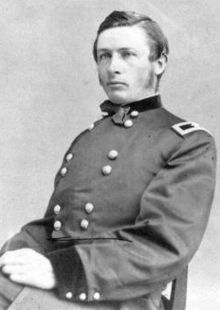Ranald Slidell Mackenzie
| Ranald Slidell Mackenzie | |
|---|---|

Ranald S. Mackenzie
|
|
| Nickname(s) | "Bad Hand", "No-Finger Chief" |
| Born |
July 27, 1840 Westchester County, New York |
| Died | January 19, 1889 (aged 48) Staten Island, New York |
| Place of burial | West Point Cemetery |
| Allegiance |
United States of America Union |
| Service/branch |
United States Army Union Army |
| Years of service | 1862–1884 |
| Rank |
|
| Commands held |
2nd Connecticut Heavy Artillery 41st U.S. Infantry 24th U.S. Infantry 4th U.S. Cavalry |
| Battles/wars | |
| Relations |
John Slidell (uncle) Alexander Slidell Mackenzie (father) Alexander Slidell MacKenzie (brother) |
Ranald Slidell Mackenzie, also called Bad Hand, (July 27, 1840 – January 19, 1889) was a career United States Army officer and general in the Union Army during the American Civil War. He was described by General Ulysses S. Grant as its most promising young officer. He also served with great distinction in the following Indian Wars.
Mackenzie was born in Westchester County, New York, to Commodore Alexander Slidell Mackenzie and Catherine Alexander Robinson. He was the nephew of diplomat and politician John Slidell and the older brother of two United States Navy officers; Rear Admiral Morris Robinson Slidell Mackenzie and Lieutenant Commander Alexander Slidell MacKenzie. His grandfather was John Slidell, a bank president and a political power broker in New York City.
He initially attended Williams College, where he was a member of the Kappa Alpha Society, and then accepted a nomination to the United States Military Academy, where he graduated at the head of his class in 1862. He immediately joined the Union forces already fighting in the Civil War.
Commissioned a second lieutenant in the Corps of Engineers, Mackenzie served in the battles of Second Bull Run, Antietam, Gettysburg, and through the Overland Campaign and Petersburg in 1864. He was wounded at Bull Run, Gettysburg and Jerusalem Plank Road. His wounding at Jerusalem Plank Road during the siege of Petersburg cost him the first two fingers of his right hand and was the probable cause for his nickname, "Bad Hand". By June, 1864, he had been brevetted to lieutenant colonel in the Regular Army due to bravery.
...
Wikipedia
